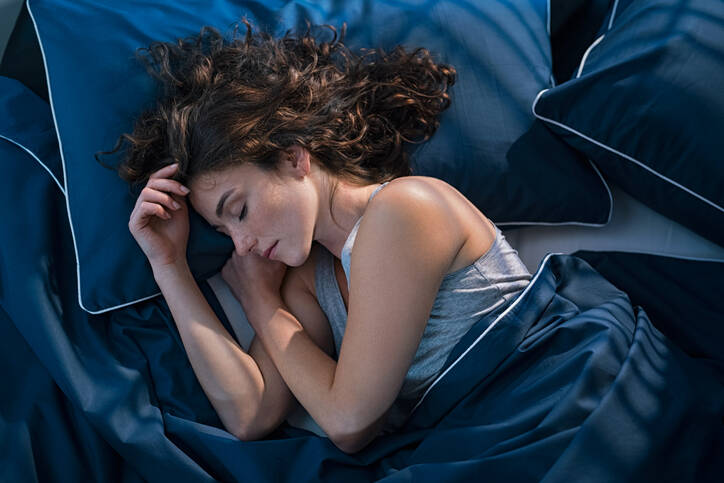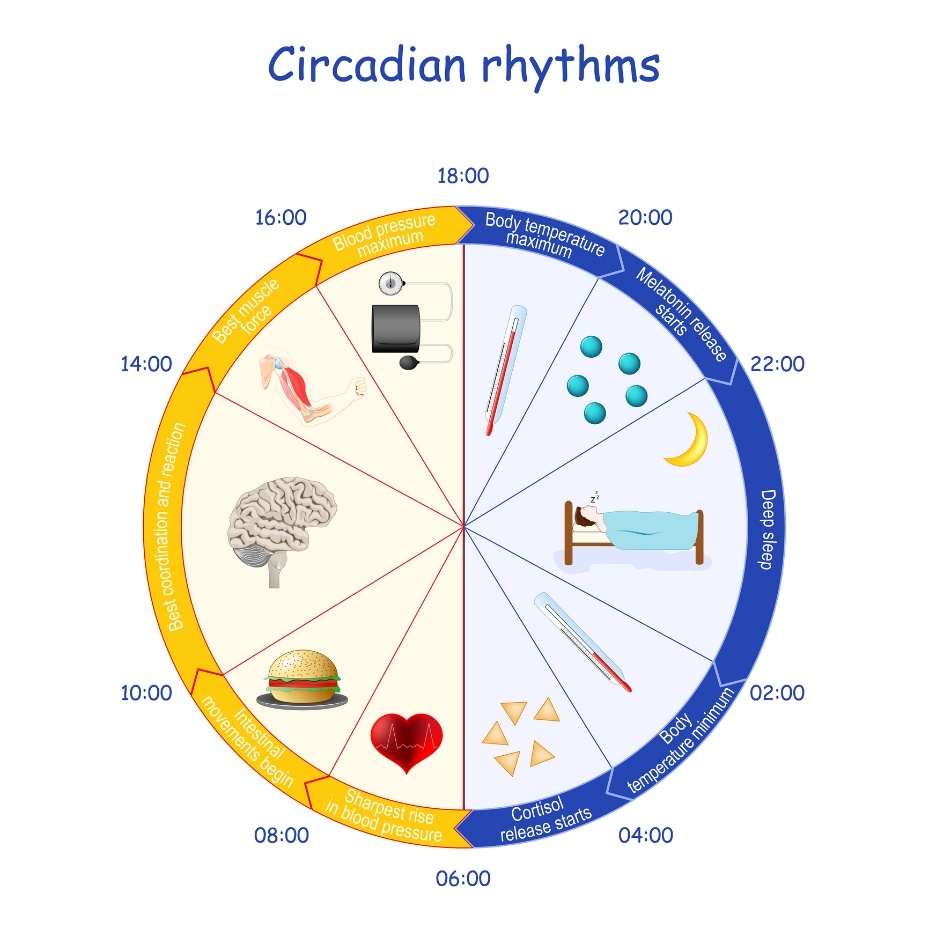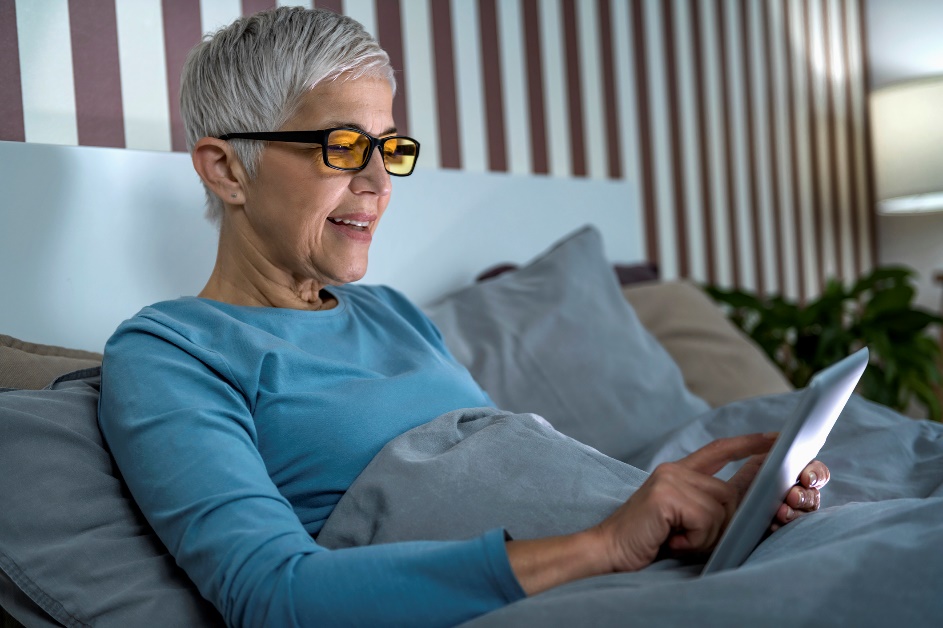- news-medical.net- What is the Circadian Rhythm? Nesw Medical Life Sciences. Yolanda Smith, B.Pharm
- solen.cz - We have known melatonin for 50 years. What do we know about it and how can we use it? doc. MUDr. Karel Šonka, DrSc., prof. MUDr. Soňa Nevšímalová, DrSc.
- nigms.nih.gov - Circadian Rhytm. National Institute of General Medical Sciences
- PracticalKelekarenstvi.cz- Melatonin. Clinical Physiology. prof. RNDr. Luděk Beneš, DrSc., †doc. MUDr. Zdeněk Wilhelm, CSc.
Sleep hygiene: 10 simple rules for quality sleep

Quality regular sleep is important for the proper functioning of the human body. What do we mean by sleep hygiene? What are the tips for better sleep and what to avoid?
Article content
- Why is quality sleep important?
- Overview of sleep stages
- Circadian rhythm (biological clock)
- Melatonin - the sleep hormone
- Sleep hygiene
- Ten principles of sleep hygiene
- 1. Regular sleep time
- 2. Elimination of blue light at bedtime
- 3. Sufficient activity during the day
- 4. Elimination of excessive activity before bedtime
- 5. Eliminate heavy meals before bedtime
- 6. Limiting the evening intake of stimulant drinks
- 7. A sufficiently dark room
- 8. A pleasantly cool and ventilated room
- 9. Suitable mattress and environment
- 10. Relaxation techniques at bedtime
The answers to these questions and other interesting information can be found in the article.
Why is quality sleep important?
Sleep is essential for the proper functioning of the body's internal systems, energy restoration, regeneration, information processing, better concentration and memory. Sleep is a regular state of rest for the body.
Full sleep reduces the risk of cardiovascular diseases, diabetes, obesity, hormonal imbalances and, last but not least, psychological diseases (dementia, depression...).
Sleep significantly affects a person's physical and mental health.
The required sleep duration is individual, taking into account age, medical history, physical and mental activity during the day.
An adult should sleep at least 7 hours a day during the night.
What happens to the body during sleep?
- Calming of the heart rate
- Lowering blood pressure
- Calming of breathing
- Muscle regeneration
- Information processing
- Promoting memory and concentration
- Sorting thoughts and stimuli
- Regulation of metabolism
Overview of sleep stages
The different stages of sleep are divided into 2 basic groups: the REM and non-REM stages. The latter is divided into 4 sub-stages.
The REM (Rapid Eye Movement) phase is characterised by rapid eye movements. It is a paradoxical sleep in which some body values correspond to the waking state.
It is a weaker phase that occupies approximately 20-25% of the total sleep time and is repeated several times a night. The characteristic feature is information transfer and dreaming.
In contrast, the Non Rapid Eye Movement (NREM) phase is characterised by slow, resting eye movements. The non-REM phase accounts for 75-80% of total sleep time.
The non-REM phase contains sub-phases of light and deeper forms of sleep.
Interesting information can also be found in the article:
How long sleep is necessary? What is REM, non-REM and why do we need to dream?
Circadian rhythm (biological clock)
Thecircadian rhythm is the biological rhythm of the body with a duration of approximately 20-28 hours. It is the alternation of waking and sleeping during one day.
Circadian rhythm is the physiological regulation of bodily processes in response to changes in the external environment.
In the maintenance of circadian biorhythm, the alternation of wakefulness and sleep occurs based on the alternation of light and darkness.
This internal biological clock influences a range of bodily processes: from the release of hormones, changes in body temperature, physical and mental performance to the regulation of metabolism and eating habits.
The hormone melatonin is an essential factor in wakefulness and sleep.
Melatonin - the sleep hormone
When there is light outside, light rays strike the retina of a person's eye. Nerves conduct this light information to the nerve nuclei in the hypothalamus in the brain. Subsequently, small amounts of the sleep hormone melatonin are secreted as the body's response.
This then reaches the melatonin receptors where it inhibits further production.
This ensures that melanin secretion is minimal during the day and in the presence of light. Conversely, melatonin is secreted in large quantities in the dark because it is not blocked by any bodily process.
Reduced melatonin levels are associated with difficulty falling asleep, poor sleep quality and subsequent exhaustion during the day.
Effects of the hormone melatonin:
- Effect on wakefulness and sleep
- Regulation of circadian rhythm
- Supporting immune processes
- Regulation of cortisol levels
- Support memory and learning
- Antioxidant effects
- Support reproductive health
Disrupted circadian rhythms and the secretion of the hormone melatonin can lead to serious health problems. Without quality regular sleep and the opportunity for the body to recover, the risk of physical and mental health disorders increases.

Sleep hygiene
Sleep hygiene can be understood as a certain stereotype of sleeping patterns that ensures quality and undisturbed sleep. The aim of sleep hygiene is to ensure that sleep has a positive effect on a person's physical and mental health.
It serves to prevent poor sleep habits that interfere with the quality and quantity of sleep.
Sleep hygiene includes many tips and practices to help address sleep problems - poor quality, interrupted, short or not deep enough sleep.
Sleep hygiene is not only about activities related to the night and sleep. It is also about activities carried out during the day and various distractions before bedtime that could negatively affect sleep quality and recovery.
How does poor sleep hygiene manifest itself?
- Insomnia
- Difficulty falling asleep
- Frequent waking
- Sleeping too lightly
- Feeling sleep deprived on waking
- Reduced fatigue during the day
- Chronic exhaustion
- Disturbances in concentration
- Frequent mood changes
What is nocturnal hypertension? How it increases the risk of health complications
Ten principles of sleep hygiene
In order to prevent health and quality sleep, it is essential to familiarize yourself with the basic advice and recommendations of experts.
It is also advisable to develop your own sleep hygiene regime, adapted to your individual lifestyle, work, daily habits and health, without deviating from the advice of experts.
1. Regular sleep time
The basic point is approximately the same time of falling asleep. Although it sounds simple, in most cases this point is a problem. It is advisable to observe an approximate time of falling asleep and waking up.
In a relatively short time, the body can adapt and then naturally gets up at the same hour even without an alarm clock.
When you adjust your biorhythm, your body will expect to sleep at a certain hour and at the same time will want to wake up at a certain approximate hour.
Ideally, it is recommended not to deviate too much from your established routine during the weekends.
However, extra caution should be taken and prolonged short periods of sleep of less than 7 hours should be avoided. The body may not have time to recover in such a short period of time. Ideally, it is advisable to apply sleep for at least 8 hours a day.
2. Elimination of blue light at bedtime
This point of sleep hygiene is extremely important for the proper secretion of the hormone melatonin, which responds to light stimuli.
Blue light from computer screens, mobile phones and similar electronic devices suppresses the production of the hormone melatonin. This can lead to reduced sleep quality and problems falling asleep.
It is recommended to eliminate exposure to blue light approximately 60 minutes before bedtime.
If working with blue light is unavoidable, it is advisable to wear special blue light filtering glasses.
At the same time, it is advisable to eliminate any excessive excitement and stimuli that stimulate our concentration before bedtime. On the contrary, increased relaxation and calming of the body and mind before bedtime is recommended.

3. Sufficient activity during the day
Regular physical activity during the day can help promote better quality sleep. Exercise strengthens the circadian rhythm and stimulates the sleep phase with longer slow waves, which is what is best for health.
Suitable times for physical activity are morning and afternoon. Conversely, it is not advisable to apply excessive physical activity in the evening before going to bed.
4. Elimination of excessive activity before bedtime
Exercise before bedtime and in the evening is not the best idea. The last physical activity should be approximately 3 hours before bedtime. As a result of exercise, there is an increase in adrenaline and other hormones that stimulate physical performance.
On the other hand, due to the evening onset of increased melatonin release, it is advisable for an individual's body and psyche to calm down before falling asleep.
5. Eliminate heavy meals before bedtime
Even if one feels hungry late in the evening, it is advisable to reach for more easily digestible foods. Too heavy and fatty foods are harder and slower to digest, which could interfere with the quality of recovery and sleep.
It is also advisable to avoid overly sweet foods, which quickly increase body energy and stimulate the body.
6. Limiting the evening intake of stimulant drinks
It is not advisable to drink any energy stimulants before bedtime. Excessively sweet drinks, coffee, green tea, caffeine stimulants and alcohol should be limited at least 4-5 hours before sleep.
Although alcohol can sometimes make you feel tired, in most cases it impairs the quality of sleep and increases the likelihood of frequent night wakings.
Drinking clean water is very important for the functioning of the body. However, beware of excessive fluid intake just before bedtime, which would increase the risk of night waking and sleep interruption due to low need.
It is advisable to reach for a herbal tea with a calming effect at least 2 hours before bedtime. Examples of herbs are lemon balm or chamomile.
7. A sufficiently dark room
In a sufficiently dark room, where contact with light is minimized, a better release of the sleep hormone melatonin can be achieved. At the same time, the body is not disturbed by light stimuli from the external environment.
8. A pleasantly cool and ventilated room
The ideal temperature for healthy sleep is an individual range of 18-20 degrees Celsius. A slightly cooler room is suitable. Conversely, an overheated and excessively warm room is inappropriate.
It is advisable to ventilate the room properly before going to bed.
Alternatively, use a constant supply of air in the form of window/micro-ventilation. Air purifiers are also suitable.
To create a pleasant atmosphere, diffusers with a gentle scent of herbs that have a calming effect should also be used. An example is lavender. However, beware of sweet and intrusive scents that are disturbing.
9. Suitable mattress and environment
The basis for a comfortable sleep is an individually selected quality mattress. In most cases, this is a memory foam mattress that is not too soft.
The choice of pillows, duvets or blankets that come into contact with the skin is also essential. Bed linen must be particularly pleasant to the touch and regularly cleaned and changed.
Items with potential allergens (dust, dust mites, feathers) should not be inappropriate in the bedroom.
10. Relaxation techniques at bedtime
The last but essential point of sleep hygiene is a calming relaxation technique (ritual) that has a soothing effect on the body and mind.
This is an individually chosen bedtime routine that induces inner calm and a pleasant feeling. The aim is to help you fall asleep more easily and get a good night's sleep.
Examples of calming bedtime routines:
- Meditation
- Autogenic training
- Prayer
- Warm shower
- Reading a book
- Soothing music
- Aromatherapy
- Relaxing muscle stretching
Will only sleeping pills really help? The thorny road to undisturbed sleep
Interesting resources










